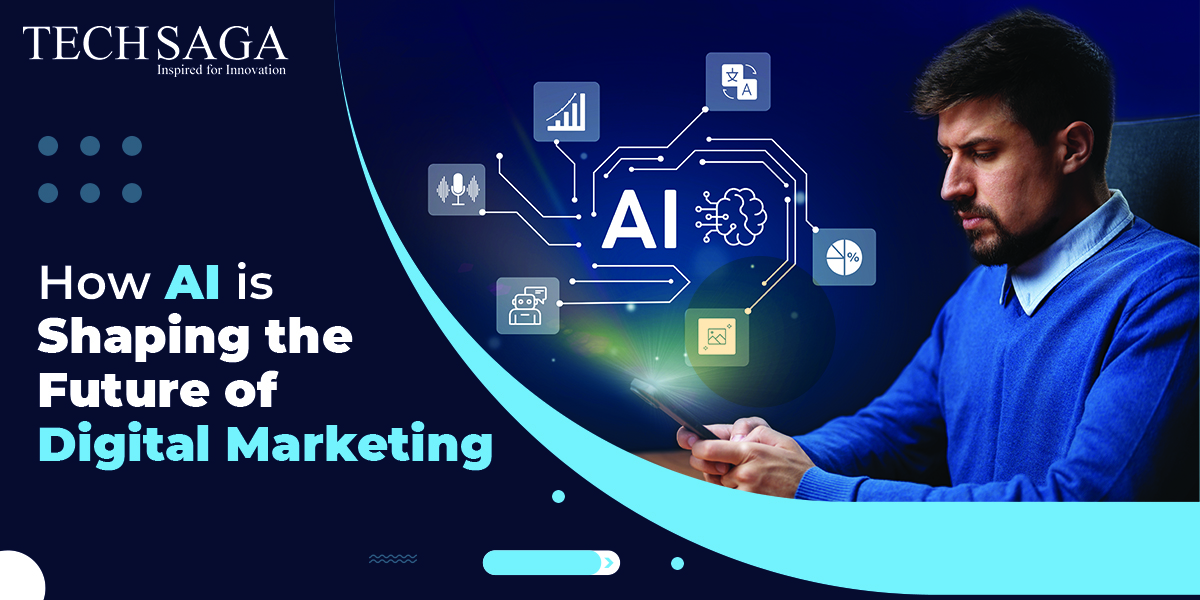Team Techsaga
Gain valuable insights and stay updated with the latest innovations through our engaging blog. Explore trends, technology advancements, and expert opinions to navigate the ever-evolving world of IT.
How Customer Experience Drives Digital Transformation
Businesses and Digital Transformation Agency are becoming more and more aware of the critical role that customer experience in guiding the direction of digital transformations in the age of fast technological innovation. Customer-centric strategies and digital evolution go hand in hand, and this has become essential for businesses looking to prosper in a cutthroat market.
The interaction between customer experience and digital transformation is transformative for firms navigating the complex currents of today’s digital landscape. Now here we explore how customer experience is the engine of digital transformation and how it will influence business in the future in this post.
Here are the major points about how customer experience drives digital transformation:
Let’s talk about customer experience that drives digital transformation in points.
Customer-Centricity as the Catalyst-
At the heart of successful digital transformation experts lies a commitment to customer-centricity. Organisations that prioritise understanding and meeting customer needs are better positioned to leverage technology in a way that directly enhances the customer experience. Digital transformations becomes a natural extension of this commitment, aligning technological investments with the goal of creating a more seamless and satisfying customer journey.
Data-Driven Decision Making-
Customer experience is a goldmine of data. Every interaction, feedback, and preference expressed by the customer provides valuable insights. Digital transformation leverages these insights through advanced analytics and artificial intelligence, enabling organizations to make informed, data-driven decisions. The result is a more personalized, anticipatory, and responsive approach to meeting customer expectations.
Omnichannel Integration-
Today’s customers engage with brands across multiple touchpoints, both online and offline. Digital transformation strives to create a cohesive, omnichannel experience where customers can seamlessly transition between various platforms without losing continuity. Therefore this integration ensures that the customer journey is unified and consistent, irrespective of the channels used.
Agility and Responsiveness-
The digital-transformation journey often involves adopting agile methodologies and technologies. Organizations can respond swiftly to evolving customer expectations, market dynamics, and competitive landscapes. By fostering agility, businesses can adjust strategies, processes, and offerings in real time, ensuring that they stay ahead in meeting or even anticipating customer needs.
Personalization at Scale-
Personalization has become a hallmark of exceptional customer experiences. Digital transformation facilitates the delivery of personalized services and content at scale. Therefore through automation, machine learning, and artificial intelligence, organizations can tailor their offerings to suit individual customer preferences, creating a more intimate and relevant engagement.
Efficient Customer Service-
Digital transformation optimizes customer service through the integration of automation and smart technologies. Chatbots, virtual assistants, and automated systems handle routine queries, freeing up human resources to focus on more complex and personalized customer interactions. Therefore this efficiency contributes to a seamless and effective customer service experience.
Innovation and Competitive Advantage-
Customer-centric digital transformation fuels innovation. Organizations that prioritize customer experience are more likely to invest in emerging technologies and develop innovative solutions. Therefore these innovations become key differentiators, providing a competitive advantage and solidifying the organization’s position in the market.
Real-Time Communication-
The digital transformation journey enhances real-time communication between businesses and customers. Through social media, instant messaging, and other digital platforms, organizations can engage with customers instantly. Therefore this immediate interaction not only builds stronger relationships but also allows for swift issue resolution, bolstering overall customer satisfaction.
Importance of digital transformation:

Digital transformation and Digital Consultation Services are more than just a buzzword; it represent a fundamental shift in the way businesses operate and deliver value to their customers. The importance of digital transformations cannot be overstated, as it has far-reaching implications across industries. Therefore here are key reasons why organizations recognize the significance of digital transformation:
Enhanced Customer Experience-
Digital transformation allows businesses to create seamless and personalized customer experiences.
Through data analytics and insights, organizations can understand customer preferences, behaviors, and expectations, tailoring products and services accordingly.
Improved Operational Efficiency-
Automation of processes and workflows streamlines operations, reduces manual errors, and enhances overall efficiency.
Cloud-based technologies and collaborative tools facilitate real-time communication, enabling faster decision-making and smoother internal processes.
Agility and Adaptability-
Digital transformation equips organizations with the agility to respond quickly to market changes, customer demands, and emerging trends.
Implementing agile methodologies enables organizations to iterate and innovate rapidly, staying ahead of the competition.
Innovation and Competitive Advantage-
Embracing digital technologies fosters a culture of innovation within organizations.
Businesses that leverage emerging technologies such as artificial intelligence, the Internet of Things (IoT), and blockchain gain a competitive edge by offering novel solutions and services.
Data-Driven Decision Making-
Therefore digital transformations provides access to vast amounts of data, empowering organizations to make informed and data-driven decisions.
Advanced analytics and business intelligence tools enable better forecasting, risk management, and strategic planning.
Global Connectivity-
Therefore digital-transformation and automation strategies break down geographical barriers, enabling organizations to operate on a global scale.
Cloud computing, online collaboration tools, and e-commerce platforms facilitate international business transactions and collaborations.
Cost Optimization-
Moreover, by automating processes and adopting cloud solutions, organizations can optimize their operational costs.
Digital transformation reduces the reliance on traditional, resource-intensive practices, leading to cost savings in the long run.
Security and Compliance-
Integrating robust cybersecurity measures is a crucial aspect of digital transformations.
Therefore compliance with data protection regulations and industry standards becomes more manageable with the implementation of secure digital systems.
Employee Empowerment-
Digital tools and technologies empower employees, enabling them to work more efficiently and collaboratively.
Remote work capabilities, digital training programs, and collaboration platforms contribute to a more engaged and productive workforce.
Read Also:- Transformation of india’s healthcare industry through technology
Scalability and Flexibility-
Cloud-based solutions provide scalability, allowing organizations to adjust their IT infrastructure based on changing business needs.
This flexibility is especially beneficial for startups and growing businesses that need to scale operations rapidly.
Adherence to Market Trends-
Staying abreast of technological advancements is crucial for remaining relevant in the market.
Digital-transformation ensures that businesses can adopt and integrate new technologies to meet evolving customer expectations and industry trends.
Sustainable Business Models-
Digital transformation facilitates the development of sustainable business models by encouraging responsible and eco-friendly practices.
Organizations can leverage technology to minimize environmental impact and contribute to corporate social responsibility initiatives.
Conclusion:
A key factor in determining how successful and progressive companies like Digital Transformation Company in India will develop in the future is the mutually beneficial interaction between digital transformation and customer experience. Moreover, these days, strategic technology integration is a dynamic journey focused on providing unmatched customer experiences rather than just automating operations.
Techsaga is a consulting firm that provides useful information about its services, industry focus, mission, and any notable achievements or distinguishing features that set it apart from other consulting firms.
TAG: Digital Marketing




